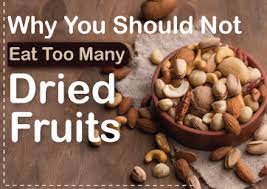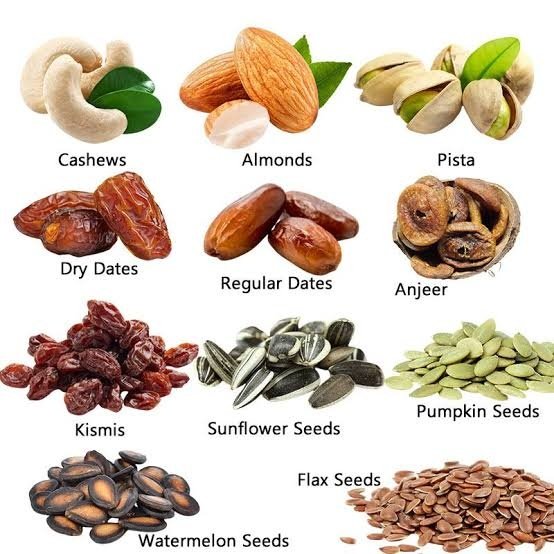Pros And Cons If Dry Fruit Eating Daily -24
Pros And Cons If Dry Fruit Eating Daily
When natural water content of Fruits have evaporated—either naturally, via sun drying, or by the application of specific dehydration techniques—are referred to as dry fruits or dried fruits. These types of fruit provide a delightful and easy method to add important nutrients to our diet.
Dry fruits are available in many varieties, with each having an own set of health advantages. Examples of these fruit types are dates, figs, and apricots. In this article we will discuss in details about Pros And Cons if Dry Fruit Eating Daily .

Dependent on the climate and locality, dry fruits can be found all over the world. A large number are made in nations with warm, dry climates where sun drying is permitted by nature.
Notwithstanding their seasonal variations, these fruits may now be found around the world because of advancements in production methods including mechanical drying and dehydration..
What are the types of Dry fruits?
Dry fruits comes in variety of forms such as
Nuts: Renowned for its ability to improve skin health and heart health, almonds are packed with protein, healthy fats, and vitamin E.
Walnuts: Perfect for heart health and cognitive function, walnuts are shaped like the human brain and are loaded with antioxidants, anti-inflammatory, and omega-3 fatty acids.
Follow Our Digiknowledge.co.in Page for Latest update about Bikes, Cars, Sports, , Life style and many more.
Dates: Packed with of fibre, natural sugars, and important minerals like magnesium and potassium, dates stimulate energy levels quickly and facilitate digestion.
Apricots: Packed full of fibre and vitamins A and C, these dried fruits also boost the immune system and eye health.
Raisins: Packed full of iron, potassium, and antioxidants, raisins are made from dried grapes and help to maintain blood health as well as digestion.
Figs: Packed with fibre, vitamins, and minerals, figs support healthy digestion and may aid in weight management.

Cashews: Packed full of protein, heart-healthy fats, and minerals like zinc and copper, cashews also boost immune system and heart health.
Pistachios: Rich in fibre, protein, and other nutrients, pistachios support heart health and may help with weight management.
Prunes: Rich in antioxidants, sorbitol, and fibre, prunes are well-known for their digestive advantages and for promoting gut health.
Cranberries: Packed with antioxidants and vitamin C, dried cranberries aid in immune system support and urinary tract health.
What are the Nutritional Benefits of Dry fruits?
Dry fruits has several benefits for our health such as-
Packed with Nutrients: A concentrated source of vital nutrients, such as vitamins, minerals, and antioxidants, dry fruits promote general health and wellbeing.
Energy Boost: Dried fruits are a great snack for anyone who need a lot of energy, especially athletes or those with high energy requirements because they naturally contain sugars that provide you an immediate and sustainable energy boost.
Heart health: A lot of dry fruits, such pistachios, walnuts, and almonds, provide heart-healthy fats that lower the risk of heart disease and improve cardiovascular health.
Digestive Health: The high fibre level of dry fruits, such as figs and prunes, helps to maintain a healthy gut flora, facilitates digestion, and avoids constipation.
Weight control: Although dry fruits are high in calories, their satiating fibre content may help curb hunger pangs and increase feelings of fullness.
Disease Prevention: By preventing oxidative stress, the antioxidants in dry fruits boost immunity and lower the risk of chronic illnesses.
Healthy Bones: Rich in calcium and phosphorus, which are necessary for strong and healthy bones, are several dry fruits like apricots and almonds.
What are the Pros of Dry fruits if consume Daily?
Nutrient Density: Due to their concentrated nutrient content, dry fruits make it easier for people to achieve their daily dietary needs.
Convenience: They are portable and easy to carry, which makes them a great on-the-go snack for people with hectic schedules.
Long Shelf Life: Compared to fresh fruits, dried fruits have a longer shelf life, which lowers the chance of spoiling and waste.
Natural Sweeteners: Compared to processed sweets, the natural sugars in dried fruits can sate sweet cravings in a healthier way, which may help with weight management.
Versatility: Dry fruits can enhance the flavor and nutritional content of meals by being added to a variety of dishes, including salads, yoghurt, and even as stand-alone snacks.

What are the Cons of Dry fruits if consume Daily?
Calorie Density: Dried fruits are high in calories in addition to nutrients. Overindulgence could result in a higher caloric intake and weight gain.
Added Sugars: In order to increase sweetness and prolong shelf life, some dried fruits that are sold commercially may contain added sugars. Selecting types without added sugar is crucial.
Sulfite Preservatives: Sulfites are commonly employed in the drying process to maintain the colour of particular fruits, however they might cause allergies or sensitivity in certain people.
Dental health: If appropriate oral hygiene is not maintained, the natural sugars and sticky texture of some dried fruits may lead to dental problems.
Fibre Overload: Consuming too many fiber-rich dry fruits without drinking enough water might cause bloating or discomfort in the digestive system.
Finally, dry fruits are a practical method to add important nutrients to our diet while also providing a host of health benefits. These vitamin-rich powerhouses are tasty and adaptable, helping with everything from heart health to digestion.
On the other hand, moderation is essential because of their high calorie content and possible risks. People can take use of the various benefits that dry fruits provide while keeping a healthy and balanced diet by being aware of the different types, nutritional advantages, and possible downsides of these foods.
Why dry fruits are necessary?
A nutrient-dense, portable food that is high in fibre is dried fruit. In addition to maintaining our general health, fibre can help with blood sugar regulation and heart health.
Which dry fruits increase blood?
Hemoglobin levels can be raised and quick energy can be obtained by eating two or three dates, a handful of raisins, and dried figs in the morning.
What are the side effects of Dry fruits?
Bloating, diarrhoea, flatulence, cramping, and constipation can result from consuming excessive amounts ofDry fruits.




